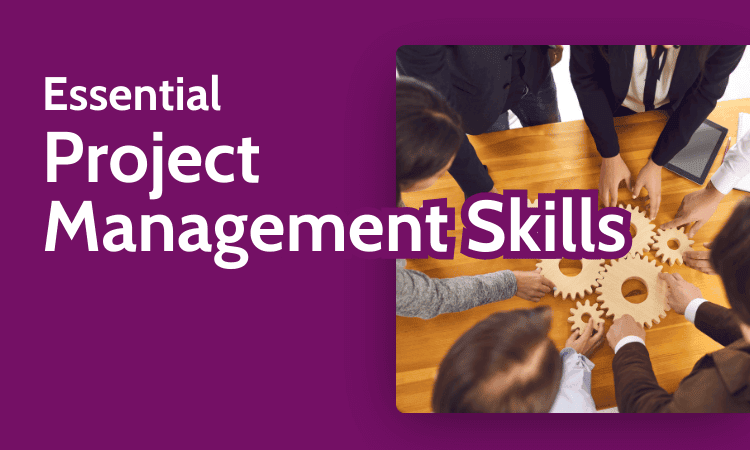
Why you can trust us
- 407 Cloud Software Products and Services Tested
- 3056 Annual Software Speed Tests
- 2400 plus Hours Usability Testing
Our team of experts thoroughly test each service, evaluating it for features, usability, security, value for money and more. Learn more about how we conduct our testing.
Key Takeaways: Essential Project Management Skills
- Soft skills for project managers include communication, problem-solving, teamwork, organization, leadership, critical thinking, conflict resolution, negotiation, adaptability and time management.
- Hard skills for project managers include project scoping and scheduling, cost control, resource management, risk management and stakeholder management. Other hard skills include change management, procurement, quality management and reporting.
- Technical skills for project managers include proficiency in project management methodology and tools, data analysis, documentation management, virtual meetings, collaboration and AI tools.
Facts & Expert Analysis About Project Management Skills
- Faster promotion: Organization, teamwork, problem-solving and communication skills are all associated with receiving a promotion 11% faster than those who lacked soft skills, while leadership skills are associated with receiving a promotion 10% faster.3
- Developing project management skills: Individuals can develop skills by obtaining certifications, working on projects to gain hands-on experience, receiving mentorship, and coaching and networking.
- Project management interview: The primary goal of interview questions is to evaluate candidates’ knowledge, their ability to handle specific situations and their interpersonal skills relevant to the job’s responsibilities.
The project management field requires a diverse set of skills to ensure successful projects. From planning and strategy to execution and team leadership, project managers need a well-rounded skill set to succeed. In this article, we’ll explore key project management skills to elevate your resume and the best project management software tools to boost your efficiency.
Below, we’ll delve into the importance of these skills, categorizing them into soft, hard and technical skills, and provide insights on developing them. You’ll also find questions to help you prepare for your next job interview. Whether you are an experienced project manager or just starting out in this field, mastering these skills can help you advance your career.
Meet the experts
Learn more about our editorial team and our research process.
What Are Project Management Skills?
Project management skills refer to the abilities required for project management professionals to successfully plan, execute and supervise projects. A successful project manager employs these skills along with project management methodologies to ensure projects are completed on time and within budget, and that they meet the organization’s objectives.
These skills fall into three categories: technical, hard and soft skills. Let’s look at each category in more detail.
Project Management
Check out our project management courses and grab a limited-time offer.
Registration available now!
Enroll Now
What Are Soft Skills in Project Management? (& Examples)
Soft skills, also known as “people skills” or “power skills,” are character traits and interpersonal skills that enable effective communication, problem-solving and collaboration in the workplace.2 These skills complement technical expertise and enable project managers to build relationships, motivate team members and navigate challenges.
Over 90% of recruitment professionals believe that soft skills are becoming more important.1 Therefore, developing and demonstrating strong soft skills can give you a competitive advantage. Examples of these skills include active listening, adaptability, critical thinking, time management and emotional intelligence.
What Are Hard Skills in Project Management? (& Examples)
Hard skills in project management refer to specific, measurable and teachable abilities that project management professionals need to successfully plan, execute and deliver projects. These skills are often obtained through formal education, online courses, training or hands-on experience.
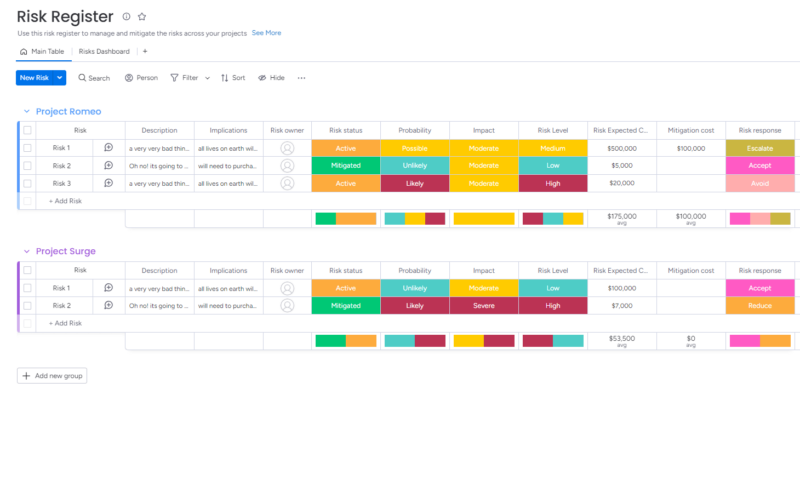
Knowing how to manage risks in software like monday.com will help you land
your dream project management job.
Examples of hard skills include project planning, risk management, budgeting and resource allocation. They enable project managers to manage projects, make data-driven decisions, identify potential roadblocks and improve workflows. Mastering these skills demonstrates your capabilities and makes you more valuable in the job market.
What Are Technical Skills in Project Management? (& Examples)
Technical project management skills are the specialized knowledge and abilities required to execute the technical aspects of a project. Additionally, they may involve expertise in specific industries, such as engineering, software development or construction.
Employers look for candidates with the right technical skills to ensure they can handle the technical aspects of a role. Examples of technical skills for project managers include knowledge of project management methodologies and proficiency in using project management tools such as monday.com or Trello.

monday.com is a well-rounded project management tool that helps project managers
stay organized and on track with their projects.
Why Are Basic Project Management Skills Important for Your Resume?
Project management skills are important for any professional, regardless of industry or role. Highlighting these skills on your resume can showcase your problem-solving capabilities, adaptability and ability to handle complex tasks and manage resources efficiently.
Furthermore, project management skills are highly transferable across multiple domains, making them attractive to employers seeking versatile professionals. Nevertheless, you should carefully review the job description and tailor the hard, technical and soft skills mentioned accordingly.
Soft Skills for Project Managers
Organizations that prioritize power skills have a 72% project completion rate and experience less scope creep.2 Below, we’ll explore 10 soft skills that the best project managers should have.
Communication
Effective communication skills are the foundation of project management. Project leaders must communicate effectively to convey information to diverse stakeholders, including team members, clients and executives. This skill includes active listening, written and verbal communication, and the ability to tailor messages to various audiences.
Problem-Solving
Project management is naturally complex, and unexpected challenges are inevitable. Strong problem-solving skills enable project managers to identify issues, analyze root causes and develop solutions to keep the project moving forward.
Teamwork
An effective project manager is skilled at facilitating meetings like retrospectives and bringing out the best in each team member. This skill entails fostering open communication, encouraging idea-sharing and creating an environment where everyone feels heard and valued.
Organization
Project management requires careful planning, scheduling and task management. Project managers need to be highly organized and capable of managing multiple tasks, deadlines and priorities simultaneously. Implementing the best organization apps is recommended to improve the process.
Leadership
Strong leadership is critical for motivating teams, providing clear direction and making difficult decisions when necessary. Effective project managers lead by example and inspire the project team to succeed.
According to LinkedIn data, leadership skills are associated with receiving a promotion 10% faster, while organization, teamwork, problem-solving and communication skills are all individually associated with receiving a promotion 11% faster than those who lacked soft skills.3
Critical Thinking
Critical thinking skills entail the ability to analyze facts and evidence to thoroughly understand a problem or situation and form a rational, skeptical and unbiased judgment. These skills allow a project management professional to navigate challenges and make informed, strategic decisions.
Conflict Resolution
Conflicts within project teams are unavoidable due to team members’ diverse perspectives and personalities. Skilled project managers can effectively resolve conflicts, find common ground, maintain a harmonious team environment and successfully navigate harmful anti-patterns.
Negotiation
A project manager often needs to balance competing priorities, resource constraints and stakeholder interests. Effective negotiation involves identifying shared interests, compromising when necessary and ultimately reaching agreements that benefit all parties and achieve the project goals.
Adaptability
Projects often encounter unexpected changes. A successful project manager can adjust the project plan and the approach as circumstances change throughout the project’s life cycle. Adaptability also includes being open to feedback and continuously seeking opportunities for improvement.
Time Management
Juggling multiple tasks and deadlines is a core part of a project manager’s job. Excellent time management skills and the use of time management tools enable a project manager to manage the team’s time, prioritize tasks effectively, minimize distractions and keep the project on track.
Hard Skills for Project Managers
The project management role, like that of a product owner or product manager, requires specific hard skills to successfully oversee project completion. You can list these skills on your resume, along with metrics, numbers and key accomplishments. Let’s take a look at the 10 hard skills required in project management.
Project Scoping
The project-planning stage establishes the project’s direction and scope using a project charter. To ensure successful completion, a project manager needs to clearly define the project goals, objectives, deliverables and requirements. Be sure to list any experience you have creating project charters on your resume.
Project Schedule
The project schedule outlines the timeline for completing tasks and milestones and sets task dependencies, helping keep the project on track. Using project management tools like Gantt charts can help a project manager visualize the schedule and effectively track progress.
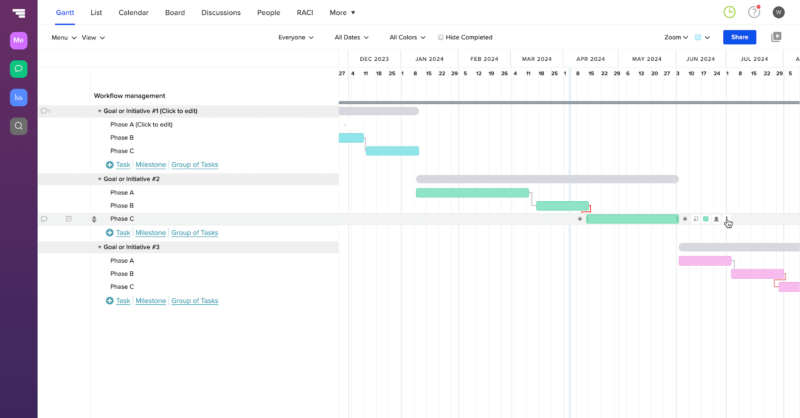
TeamGantt is a user-friendly platform for creating and managing Gantt charts.
Cost Management
Cost management involves estimating, budgeting and controlling costs throughout the project life cycle. This project management skill ensures the project stays within budget and helps identify any potential cost overruns early on.
Resource Allocation
A project manager is responsible for allocating human resources and other resources. This can include assigning the right tasks to team members, making sure that equipment and materials are available when needed and managing the team’s overall workload.
Risk Management
A project manager must understand risks and issues to effectively plan for and mitigate them throughout the project. This process involves identifying potential risks, assessing their impact and developing strategies to minimize their effects on the project. Check out our ClickUp review if you need efficient risk-tracking software.
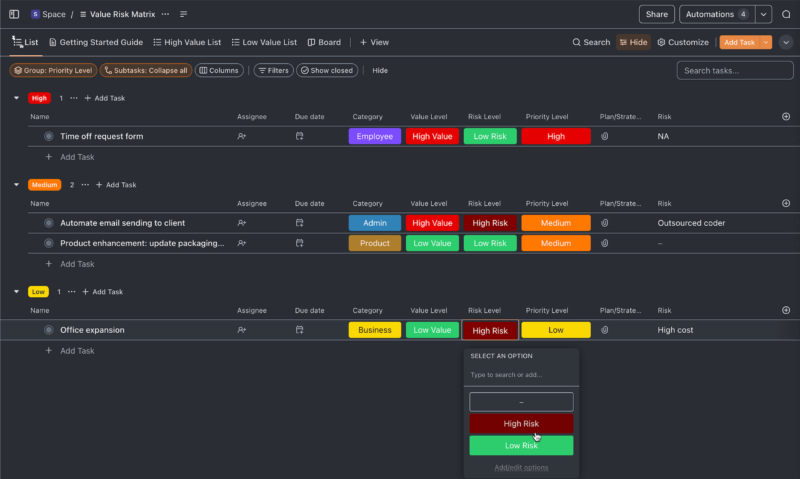
ClickUp lets project managers track and monitor risks, making it easier
to efficiently address them.
Stakeholder Management
Each project has a specific set of stakeholders with different expectations for the project’s outcome. It is the project manager’s responsibility to identify stakeholders, understand their needs and expectations, and manage their involvement throughout the project.
Change Management
Changes always occur, especially in Agile development. It is important for project managers to have a solid plan to handle any unexpected adjustments that might arise. They need to assess the impact on the project, communicate changes to stakeholders and regularly refine the product backlog to reflect changing requirements.
Change management also covers the process of switching from a methodology like Waterfall to an Agile framework such as Scrum, introducing new technology or software, or changing an organization’s structure. Changes like this can often lead to team member pushback. If you want your career to advance, it might be worthwhile to obtain a change management certification.
Procurement Management
Procurement is the process of obtaining goods and services to operate a business. A project manager must carefully select suppliers, negotiate contracts and ensure that all procurement documents and activities align with the project’s budget and timeline.
Quality Management
To ensure that the project meets quality standards and requirements, project managers must define quality metrics and conduct quality control processes. They should also conduct quality assurance to identify problem areas and improve processes.
Project Reporting
Reporting on key performance indicators and milestones is essential for stakeholders to understand the project’s status and make necessary adjustments. Clear and concise project reports also facilitate communication and decision-making within the project team.
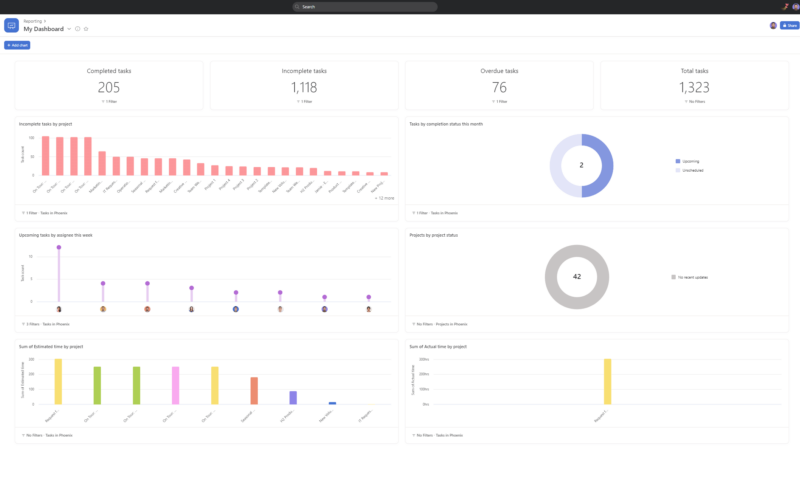
Dashboards in project management software can help you quickly view
key project metrics.
Technical Skills for Project Managers
To stand out in the project management field, possessing strong technical skills is crucial. These skills allow project managers to troubleshoot technical issues, communicate effectively with IT teams and adapt to new technologies. We will look at 10 technical skills that project managers should develop.
Proficiency in Project Management Methodologies Using Project Management Tools
A project management software platform is the central hub for all project-related information and activities. Project managers should be proficient in using tools to effectively plan, assign tasks and track progress. Check out our roundup of cheap project management software if you have a tight budget.
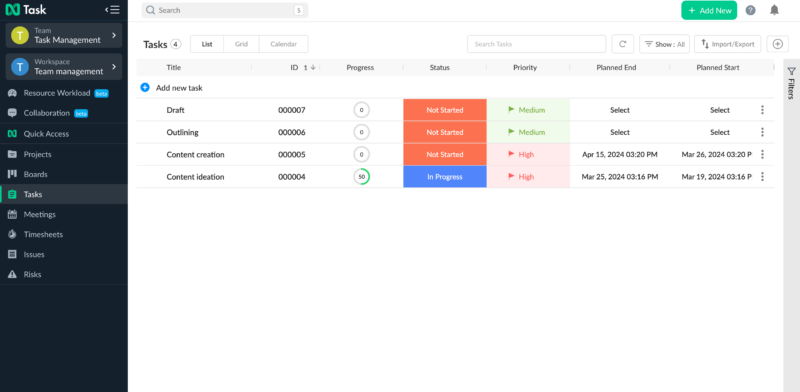
nTask is the best affordable project management app for small
to medium-sized teams.
Data Analysis
Data analysis helps make informed decisions based on trends and patterns, identify risks early on and estimate project timelines more accurately. Using tools like Microsoft Excel, Power BI or Tableau can help with effectively analyzing and interpreting data.
Document Management System
Project managers are responsible for managing project documentation such as reports, contracts and project information. A good document management system like Google Drive or Dropbox can help organize and store these documents in a secure and accessible way. Many project management tools also have built-in document management features.

Zoho Projects offers a document management feature that allows teams
to manage project documents.
Virtual Meetings and Collaboration Tools
As remote teams become more common, project managers must be fluent in using virtual meeting and collaboration tools like Zoom, Microsoft Teams or Slack. These tools enable effective communication, virtual meetings, screen sharing and real-time collaboration, ensuring project teams can work together seamlessly regardless of location.
Additionally, some real-time collaboration tools, such as mind maps in ClickUp, whiteboards in monday.com and document creation tools in Trello or Jira, can improve team creativity and productivity by providing a visual platform for brainstorming and organizing ideas.
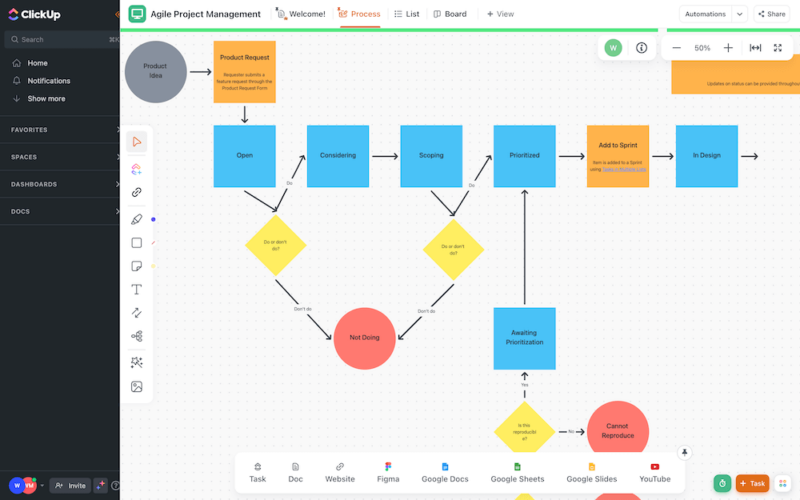
Mind maps in ClickUp allow team members to visually
map out complex ideas and concepts.
Technical Knowledge in a Specific Domain
A project manager should be knowledgeable in the technical aspects of the industry or field in which the project operates, including relevant technologies, processes and best practices. It is also recommended to continuously learn and stay up to date on the latest advancements and trends.
Artificial Intelligence (AI) Tools
AI is becoming more integrated into the workplace, with 75% of knowledge workers using it and 46% of users having adopted it within the last six months.4 Project managers should be familiar with AI tools and how they can streamline project management, such as AI-powered analytics for data-driven decision-making or chatbots or virtual assistants for workflow automation.
How to Develop Project Management Skills: Top Tips
Now that you have a broad understanding of the qualities of a project manager, it’s time to focus on further developing your skills. Here are some useful tips on how to improve project management skills.
Enroll in Training and Certification
Training and certification programs offered by organizations like the Project Management Institute (PMI) or the International Project Management Association (IPMA) cover project management principles, tools and techniques you need to oversee successful projects.
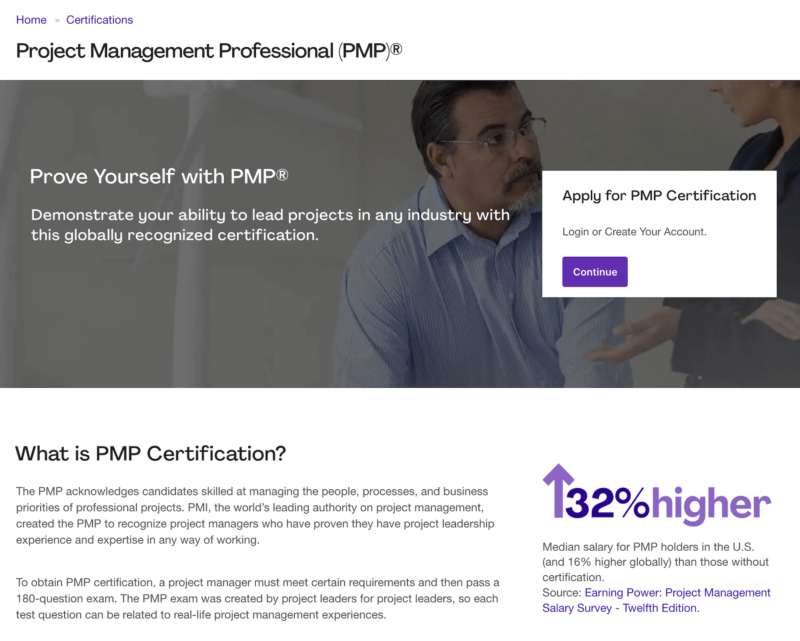
The PMP certification is one of the most well-recognized
project management certifications.
Some of the best project management certifications include the Project Management Professional (PMP), the Certified ScrumMaster (CSM) and the PMI-Agile Certified Practitioner (PMI-ACP). Obtaining and showcasing these certifications can boost your credibility and marketability in the job market.
Gain Hands-On Experience
Certain hard skills or even interpersonal skills can be developed through practical experience. You’ll need to look for opportunities to work on projects, learn from your mistakes and improve the skills you lack. The more experience you have, the more confident and proficient you will be at managing projects.
Seek Mentorship and Coaching
Seeking out mentorship and coaching from experienced professionals can help you advance your career and avoid common pitfalls. Learn from their experience, ask questions and get advice on best practices and strategies for handling project challenges.
Networking and Collaboration
Building a strong professional network can provide valuable insights, support and potential opportunities for growth. You can attend industry events, join professional associations and collaborate with other project managers to exchange knowledge and best practices.
What Makes a Good Project Manager?
Not only do project managers need soft, technical and hard skills, but they also need certain personal traits to excel in their role. Here are five characteristics that make a good project manager.
- Growth mindset: A growth mindset is the belief that abilities can be developed through learning and hard work. Project managers with a growth mindset are open to new challenges, persist despite obstacles, see hard work as a way to mastery and learn from criticism and feedback.
- Initiative: Taking initiative involves being proactive, taking ownership of tasks and looking for new opportunities to drive the project and innovate.
- Curiosity: A curious mindset encourages project managers to ask questions, learn new skills and find creative solutions to problems.
- Empathy: Having empathy enables project managers to understand the perspectives and emotions of team members, stakeholders and clients, thus fostering strong relationships and effective communication.
- Continuous learning: Project managers who prioritize continuous learning and self-improvement can keep up with industry trends, enhance their skills and adapt to new best practices.
Project Management Skills Interview Questions: Examples
Project management interviews focus on assessing candidates’ knowledge, how they handle specific situations and the people skills they have that are relevant to the job title and responsibilities. Here are seven sample interview questions aimed at evaluating project management skills:
- Describe a recent project you managed from start to finish, including the challenges you faced and how you overcame them. The interviewer is evaluating your practical experience, decision-making skills and knowledge of project management methodologies.
- Which project management tools do you use and how do they help you with a project? This question determines your familiarity with project management tools and your ability to apply them to your position. It also gives insight into your organizational skills and attention to detail.
- Which project management methodologies or frameworks are you familiar with, and how have you applied them? This question evaluates your knowledge of project management methodologies and your practical experience in applying them to real-world projects.
- How do you handle scope creep or changes in project requirements? Scope creep is a common challenge in project management. This question tests your adaptability and ability to manage change while keeping project timelines and budgets on track.
- Describe a situation where a project was at risk of missing a deadline or exceeding the budget. How did you address the issue and get the project back on track? The interviewer wants to know how you think, how you make decisions and how you mitigate and reduce project risks.
- How do you measure and ensure project success during and after completion? The interviewer wants to know how you define and track project success metrics, as well as your ability to learn from completed projects.
- How do you prioritize tasks and manage multiple deadlines simultaneously? This question evaluates your time management and organizational skills to ensure successful project delivery.
Final Thoughts
Becoming a project manager requires a well-rounded set of skills. The project management skills covered in this article, such as communication, leadership, resource management and cost control, are essential for improving your resume and advancing your career. With this article as a guide, you can focus on your weaknesses and take steps to develop new skills.
Moreover, the role of a project manager is not static — it demands continuous learning and skill development. By pursuing certifications or gaining more experience with real-world projects, you can broaden your skills, better navigate project management challenges and deliver successful outcomes.
Which skills do you think are most important for project managers? Which project management skill do you want to develop further? Are there any strategies you have found helpful in successfully managing projects? Share your thoughts and experiences in the comments section below. Thanks for reading.
FAQ: Top Project Management Skills List
-
Communication, leadership and organization are the top three most important project management skills needed to succeed in this field.
-
The five basics of project management are initiation, planning, execution, monitoring and closure. In order to have a successful career in project management, you’ll need to be proficient in all of these areas.
-
Project management is considered both a hard skill and a soft skill. Hard skills in project management involve tangible, measurable abilities such as creating project plans, setting budgets, managing resources and tracking progress.
Communication, leadership and organization are the top three most important project management skills needed to succeed in this field.n”}},{“@type”:”Question”,”name”:”What Are the 5 Basics of Project Management?u00a0″,”acceptedAnswer”:{“@type”:”Answer”,”text”:”
The five basics of project management are initiation, planning, execution, monitoring and closure. In order to have a successful career in project management, youu2019ll need to be proficient in all of these areas.n”}},{“@type”:”Question”,”name”:”Is Project Management a Hard Skill?u00a0″,”acceptedAnswer”:{“@type”:”Answer”,”text”:”
Project management is considered both a hard skill and a soft skill. Hard skills in project management involve tangible, measurable abilities such as creating project plans, setting budgets, managing resources and tracking progress.n”}}]}]]>
Sources:
- LinkedIn Workplace Learning Report 2024
- PMI – Pulse of the Profession 2023 Report
- LinkedIn Data: Soft Skills Tied to Faster Promotions
- AI at Work Is Here. Now Comes the Hard Part
Let us know if you liked the post. That’s the only way we can improve.


